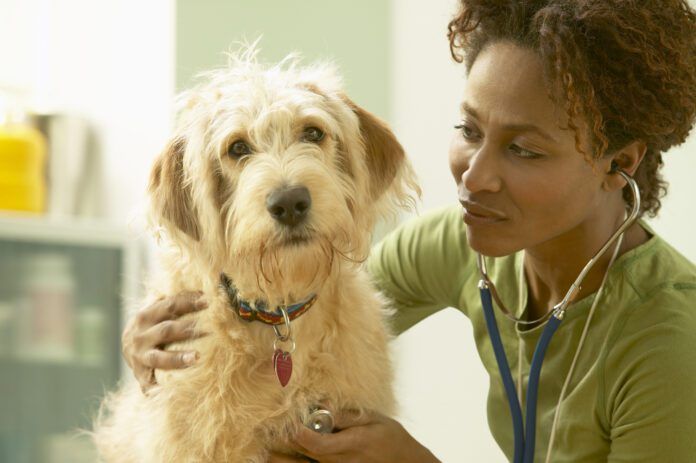Even if they appear healthy, routine vet visits for dogs are essential for early detection of health issues, disease prevention, and maintaining a high quality of life. Many pet owners wait until their dog shows signs of illness before scheduling an appointment, but by then health issues may have progressed to a point where they are both more complicated and more expensive to treat.
How Much Does a Vet Visit for a Dog Cost?
The cost of veterinary care varies significantly depending on your location and your dog’s specific needs. On average, a wellness exam costs between $70 and $150, though it may be higher in urban areas or for specialty clinics. Vaccines typically cost around $15 to $100 each, depending on the vaccination itself, often plus an office-visit charge.
Basic bloodwork panels can cost between $80 and $200, depending on how comprehensive the testing is. Additional services, such as fecal exams, urinalysis, or heartworm and Lyme testing will add to the cost of the visit. Pet insurance or wellness plans offered by some veterinary practices can help offset these expenses and make preventative care more affordable.
How Much Is a Vet Visit for a Dog Without Insurance?
The cost of a vet visit without is the same as the cost of a vet visit with insurance. That’s because, for most pet insurance policies, you must pay the veterinarian at the time of service and then submit a claim to your insurance for reimbursement. Some plans do offer forms of direct pay to the veterinarian, but they each have their own system. And, for basically all of them, your veterinarian must be willing to accept this method of payment.
How Often Should You Take a Dog to the Vet?
For most adult dogs, a vet visit once a year is the general guideline, and even if you think your dog is well, it’s important for your dog to see your veterinarian once a year to remain an active client.
An annual wellness check typically includes a physical exam, vaccinations, and possibly screening tests, such as bloodwork, depending on the dog’s age, breed, medical history, and lifestyle. During a physical exam, the vet will check your dog’s heart, lungs, ears, eyes, teeth, and overall body condition. They may ask you about your dog’s behavior, diet, and activity level to assess any subtle changes that could indicate an underlying problem. Vaccinations, such as rabies, distemper, and Bordetella, are often updated at these appointments as well.
Bloodwork, which is often recommended for dogs annually, especially as they age, typically includes a complete blood count (CBC) and a chemistry panel to evaluate organ function. Bloodwork can uncover infections, anemia, diabetes, liver and kidney problems, and more. While not always necessary at every visit, annual or bi-annual bloodwork gives your vet a baseline to detect changes, which can be early signs of disease.
Puppy Veterinary Visits
Puppies require more frequent vet visits, usually every three to four weeks until the puppy is around 16 weeks old. These early visits are focus on vaccination series, deworming, parasite prevention, and monitoring growth and development. After the first year, most dogs transition to the once-a-year schedule, but some dogs, particularly those with chronic health issues, senior dogs, or dogs on long-term medications, may need checkups every three to six months.
Even if your dog seems perfectly healthy, regular vet visits allow for early detection of diseases that may not yet show symptoms. Conditions like kidney disease, thyroid imbalances, dental disease, arthritis, and certain cancers can be identified through physical exams, bloodwork, and urinalysis before your dog begins to act sick. Catching these issues early often leads to better outcomes for your pet and can significantly extend their life. Additionally, routine checkups allow your vet to keep your dog up to date on flea, tick, and heartworm preventatives, which are critical for long-term health and comfort.
Vet visits are not for just when your dog is sick, they are an essential part of preventative care that can help detect problems early, maintain your pet’s health, and ensure a longer, happier life. While the costs of routine veterinary care can add up, they are often far less than the expense associated with treating advanced illnesses, making regular vet visits a wise and compassionate investment.







From my experience, going to a vet is only helpful if the veterinarian knows what s/he’s doing (or has a conscience and/or isn’t predominantly profit-driven).
We visited a, to us new vet with our 15-yr old dog to find advice on how to speed up recovery from two definitely improving, but still present health problems. We didn’t receive any advice but the, as it turned out ‘ITS THE LAW’-veterinarian vaccinated our pup with the rabies vaccine. After less than 2 weeks our dog had two new and this time severe and ever worsening symptoms which eclipsed his life in a cruel, miserable way much too early.
I would have walked out of the vet’s office with our dog without rabies ‘refresher jab’ (our dog had all the ‘puppy shots’ and a rabies titer), had I been sure that even vaccine manufacturers state in their package insert that *only healthy* animals should be injected with their vaccines.
I think every pet owner should know this so they aren’t overrun by incompetent and/or ignorant and/or strongly profit-driven veterinarians.
I forgot to mention that this veterinarian found a heart murmur during his quick exam of our pup before he injected him with the rabies vaccine. A few days after the vaccination, I found an approx. 1″ large round hard immobile growth behind the ribcage. Later, after requesting information on the vaccine which the veterinarian had used, I found out that the vaccine contained mercury while the same manufacturer also provides a thimerosal-free version. I still wonder why any veterinarian would choose the mercury-containing version instead of the most likely somewhat safer alternative.
Thanks to this tragedy, I will be much better prepared to avoid a similar sad story in the future.
Before allowing any vaccination, I will insist on a rabies titer (which that veterinarian outright rejected although he could have done a new titer with the blood he was drawing anyway that same day and the analysis results came in the next day).
I will never again allow any unhealthy animal be injected with any vaccine.
I will ask to get all the information of the ‘required’ vaccine beforehand and do my research on it before permitting injection.